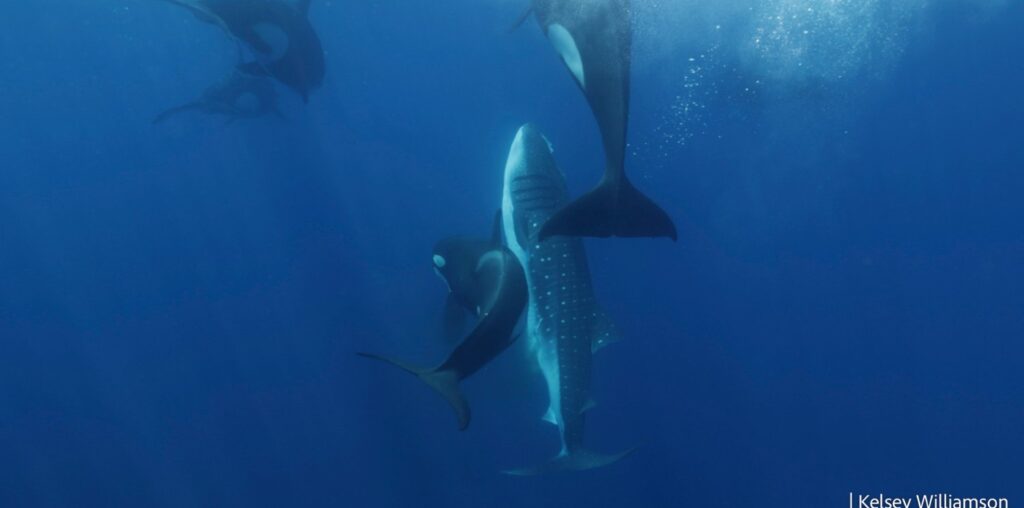Orcas (Orcinus orca) might be even more ferocious predators than we give them credit for. Scientists have discovered orcas that have learned to hunt whale sharks (Rhincodon typus), the largest fish in the world.
Marine biologists documented the never-before-confirmed behavior among orcas living in the Southern Gulf of California, the body of water between the state and country of Mexico. They found evidence of several whale shark attacks that occurred over a six-year-span—most of which involved one particular male orca known as Moctezuma. While much is still unknown about the phenomenon, the findings suggest these killer whales may have acquired and passed on unique knowledge that allowed them to take down their hefty prey.
Despite their friendly reputation from TV shows and movies, orcas are well known to be apex predators wherever they live, hunting a wide variety of fish, rays, and marine mammals, including other dolphins. Orcas have also been recorded hunting various kinds of sharks, including the great white shark, but not whale sharks—an animal that would pose a considerable challenge for any predator. While orcas are the biggest living members of the dolphin family, they’re still far outsized by the whale shark. The average adult orca is around 20-feet-long (6 meters) and weighs six tons, while the average whale shark may extend as long as 45 feet (13.7 meters) and weigh up to 20 tons (some individual whale sharks are even more massive).
Adult whale sharks aren’t thought to have any natural predators, but younger and smaller ones are sometimes hunted by sharks and other large fishes. Whale sharks have been spotted feeding in the Gulf of California, including juvenile sharks, and there have been anecdotal reports of orcas in the area hunting them (even adults). But this new research, published Friday in the journal Frontiers in Marine Science, is the first of its kind to confirm the reports.

Marine biologist Erick Higuera Rivas and his colleagues collected photo and video evidence from the public and scientists detailing four hunting events that happened between 2018 to 2024. They found that the orcas cooperated to methodically weaken and ultimately kill their large prey, often by focusing on one particular part of the whale sharks’ bodies: their pelvis.
“We show how orcas displayed a collaboratively hunting technique on whale sharks, characterized by focusing on attacking the pelvic area causing the whale shark to bleed out and allow orcas access to the lipid-rich liver,” said Higuera Rivas, a scientist at the non-profit marine research organization Conexiones Terramar, in a statement from Frontiers.
The orca Moctezuma was observed at three of these attacks, while another female orca previously seen with Moctezuma also took part in one attack. The repeated presence of these orcas at the attacks, coupled with their precise method of hunting, suggest that they’re part of an orca pod that has become specialized in killing whale sharks, the researchers say.
“When hunting, all pod members work together, hitting the whale shark to turn it upside down. In that position the sharks enter a state of tonic immobility and can no longer move voluntarily or escape by going deeper,” Higuera Rivas said. “By keeping it under control, the orcas then have greater ease and speed in approaching the pelvic area of the shark and are able to extract organs of nutritional importance for them.”
Both whale sharks and orcas are widely distributed, though whale sharks prefer sticking to warmer, tropical waters. So it’s certainly possible that orcas elsewhere have learned how to hunt these massive fish. Right now, though, there’s not much data available that can tell us either way. If Moctezuma and his pod are unique whale shark hunters, that could also have important implications for the conservation of this marine region. Any harmful changes to the whale shark population in the Gulf could affect their chances of survival, for instance. And the researchers say that more care is needed to ensure that tourists and other visitors to the area aren’t disturbing the environment too much.
The ocean is filled with all sorts of mysteries and unknowns, particularly in the darkest and deepest crevices of the world. But it seems that even some of the largest and most well-known marine creatures around have their own secrets still left to be unraveled.

